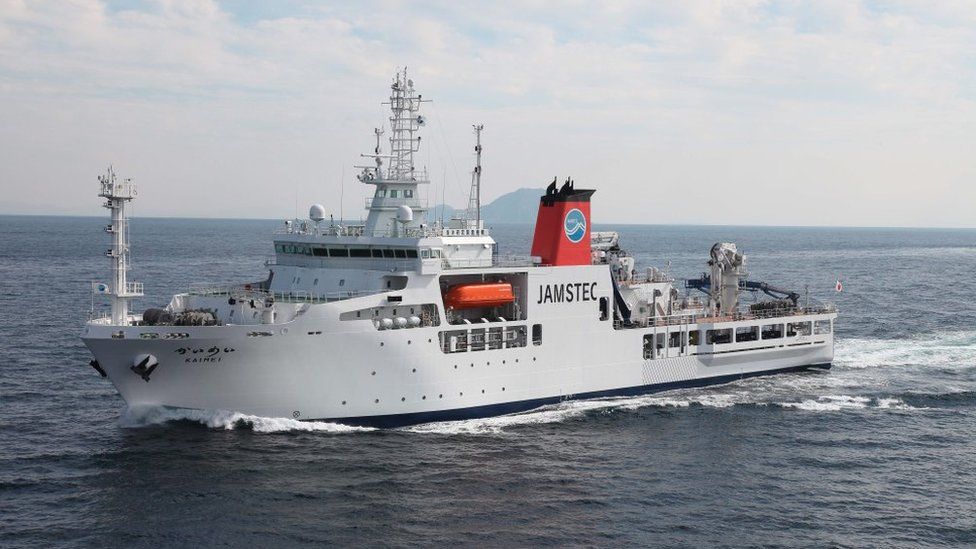Scientists just dug the deepest ocean hole in history
The team drilled a hole nearly 5 miles (8,000 m) below the Pacific Ocean's surface to study the region's earthquake history.

Get the world’s most fascinating discoveries delivered straight to your inbox.
You are now subscribed
Your newsletter sign-up was successful
Want to add more newsletters?

Delivered Daily
Daily Newsletter
Sign up for the latest discoveries, groundbreaking research and fascinating breakthroughs that impact you and the wider world direct to your inbox.

Once a week
Life's Little Mysteries
Feed your curiosity with an exclusive mystery every week, solved with science and delivered direct to your inbox before it's seen anywhere else.

Once a week
How It Works
Sign up to our free science & technology newsletter for your weekly fix of fascinating articles, quick quizzes, amazing images, and more

Delivered daily
Space.com Newsletter
Breaking space news, the latest updates on rocket launches, skywatching events and more!

Once a month
Watch This Space
Sign up to our monthly entertainment newsletter to keep up with all our coverage of the latest sci-fi and space movies, tv shows, games and books.

Once a week
Night Sky This Week
Discover this week's must-see night sky events, moon phases, and stunning astrophotos. Sign up for our skywatching newsletter and explore the universe with us!
Join the club
Get full access to premium articles, exclusive features and a growing list of member rewards.
A team of researchers working off the coast of Japan just drilled a hole in the Pacific seabed deeper than any hole in any ocean before it.
On May 14, scientists aboard the research vessel Kaimei lowered a long, thin drill called a giant piston corer nearly 5 miles (8,000 meters) through the Pacific Ocean — waiting two hours and 40 minutes until the drill finally reached the bottom of the Japan Trench, according to a statement. There, the team extracted a 120-foot-long (37 m) sediment core from the bottom of the sea before slowly hauling the corer up again.
The drill site is located very close to the epicenter of the magnitude-9.1 Tohoku-oki earthquake, which battered the region in 2011 and produced a gargantuan tsunami that smashed into the Fukushima Daiichi nuclear power plant, triggering a devastating meltdown. By studying sediment from this area, the researchers hope to learn more about the trench's ancient earthquake history.
This deep drilling operation blows the previous ocean drilling record holder out of the water. For nearly 50 years, that record has belonged to the research vessel Glomar Challenger, which sunk a drill into the Mariana Trench in 1978. That operation recovered a sediment core from about 4.3 miles (7,000 m) below the surface — or about 1,000 m closer to fresh air than the recent RV Kaimei expedition, the team said.
As for the deepest hole ever dug, on land or sea? That title goes to the Kola Superdeep Borehole, created by Russian scientists in the country's far northern Kola Peninsula in 1989. Drilling for the project began in 1970; nearly two decades later, the hole reached a maximum depth of 7.6 miles (12,200 m) below the surface.
The Kola project turned up many geological samples from the continental crust — but, sadly, no buried treasure. No big loss, in the end; sometimes in Siberia, gold just falls from the sky.
Originally published on Live Science.
Get the world’s most fascinating discoveries delivered straight to your inbox.

Brandon is the space / physics editor at Live Science. With more than 20 years of editorial experience, his writing has appeared in The Washington Post, Reader's Digest, CBS.com, the Richard Dawkins Foundation website and other outlets. He holds a bachelor's degree in creative writing from the University of Arizona, with minors in journalism and media arts. His interests include black holes, asteroids and comets, and the search for extraterrestrial life.
 Live Science Plus
Live Science Plus










